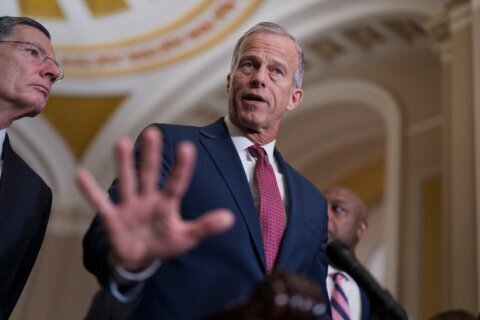WASHINGTON — House Speaker John Boehner’s sudden resignation not only from the speakership but the House seat he’s held since 1991 is no surprise, Politico’s Glenn Thrush tells WTOP — and it makes the coming showdown over keeping the government running even less predictable.
As Boehner presided over a House Republican caucus that has become increasingly conservative over the years, with repeated threats of government shutdowns, debt defaults and leadership challenges to the Speaker himself, Thrush says of Boehner, “He’s incredibly fed up.”
There were nine votes by his fellow Republicans, for six candidates, against Boehner’s speakership in 2013, and 24 at the beginning of this year, Politico has reported. Another challenge was filed in July, and just a few days ago, Thrush says, Sen. Ted Cruz, R-Texas, attacked Boehner on Sean Hannity’s radio show. Sen. Marco Rubio, R-Florida, broke the news of Boehner’s resignation to a group of religious conservatives in Washington Friday and was met with cheers, CBS News reports.
Thrush says he conducted a long interview with Boehner after the 2013 leadership challenge, and says, “He seemed like a guy who was looking or an exit strategy.”
“His best friends” in the House — moderate Republicans from the Midwest — have left over the years, “so he’s been isolated and alone,” Thrush says.
He adds that Pope Francis’ address to a joint meeting of Congress on Thursday may have played a major factor in the timing of Boehner’s decision. It was the first speech by a pope to Congress and something Boehner, a Catholic, had been trying to make happen for about 20 years.
“It may have been the ultimate mic-drop moment,” Thrush says:
With the current push to shut down the government over funding for Planned Parenthood, as well as the latest sniping from members of his own party, Thrush says, “You can’t really blame the guy.”
Still, the government is staring down a Sept. 30 funding deadline before the federal government would shut down, and Boehner’s resignation just makes the process “totally unpredictable,” Thrush says.
“Every time they’ve tried to wrangle a vote together on big budget measures, it’s been incredibly difficult,” Thrush adds. “And I can’t imagine that gets any easier with Boehner as a lame duck.”
Susan Page, USA Today’s Washington bureau chief, thinks the opposite. She tells WTOP that she thinks that Boehner’s resignation makes a shutdown less likely, because “Boehner could now cut a deal with Democrats to keep the government open, to have a clean funding bill, because what else are House Republicans going to do to him?”
She also thinks the conservatives could consider Boehner’s resignation victory enough to sign on to an agreement to keep the government open until December, “when we’d go through this all over again.”
Thrush says that the question of who will replace Boehner, and how that will affect the possible shutdown, could get very tricky. Rep. Paul Ryan, chairman of the Ways and Means Committee, could have some support, Thrush says, but he has already said he doesn’t want the job. Majority Leader Kevin McCarthy could draw significant support, but it’s unclear whether he wants to succeed Boehner either.
Page says that McCarthy might step up, but adds that Raul Labrador, R-Idaho, who challenged McCarthy at the beginning of the last Congress, is another name near the top of people’s lists. When Labrador ran into reporters Friday morning, Page says, he refused to say whether he’d run.
If neither of those two stand for the job, Thrush says, “It could be chaos.”








